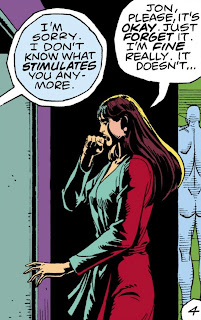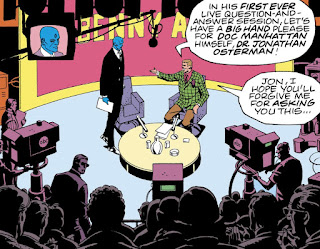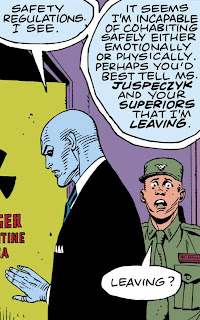Alan Moore said that when he started working on Watchmen, he realized he only had enough story for six issues, which was unfortunate because he had been contracted to write 12. Even though he still turned out a sublime work of art, there are a few times where it feels like Moore is stretching things out to make that 12-issue quota. And this is where that begins for me, which is a shame, as this issue features the biggest part of Adrian Veidt’s plan.
This issue opens with two characters that the story probably didn’t need to include — Bernard and Bernie. Keeping with the theme of creating unlikable characters, Bernard is an old newspaper vendor, who constantly proclaims he was right, regardless what the headlines say, and Bernie is a freeloader, who spends his time reading comics he doesn’t pay for.
At this point in the story, we still don’t know this is Rorschach. But this is a truly frightening, unhinged appearance for him. He likes to pretend that his mask is his real face, but I think this is. Rorschach is a deranged, intimidating psycho, whose one indulgence in the world is a far-right newspaper.
Whether he means to be or not, Rorschach is a rather funny character. And although this scene is humorous, it is consistent with his character. His first journal entry in issue #1 begins with him searching for signs in grotesque oddities he encounters. Reading — and believing — a sensationalist tabloid is absolutely something he would do. And, as we’ll see later, Rorschach understands that the “end of the world” is more of a process than a singular event.
We then move to an unsettling scene of Dr. Manhattan trying — and failing — to sexually please Lauri by duplicating himself. The failing part isn’t surprising. But the attempt is. Dr. Manhattan was introduced to us a being that sees no difference between a living human and a dead one. But as this issue will show us, there is a real, feeling Jon Osterman still buried deep down inside him. Perhaps he was sparked by the Comedian’s death, which reminded him of the horrific moment when he realized just how removed he was from humanity. But despite this renewed interest in deepening his connection with his girlfriend, he’s incapable of giving her his undivided attention.
He doesn’t understand why Laurie was upset by him continuing to work while simultaneously making love to her. But there is just enough Jon left inside Dr. Manhattan to feel bad that he’s hurt Laurie’s feelings. And it’s that little bit of remaining emotion that will be so crucial to Adrian’s plan.
Jon’s first girlfriend, Janey Slater, is an embittered woman dying of cancer. Yet the story she tells the newspaper is 100% accurate. Not that we needed another reason to dislike Dr. Manhattan, but he literally did hook up with a 16-year-old girl.
Laurie also seems to have been sparked by the Comedian’s death, building on the feelings that began in the first issue. She didn’t realize just how isolated she was until the outside world in the form of Rorschach forced its way in. And she had forgotten how nice it was to talk to a real human being until her dinner with Dan.
Lauri wasn’t dumped for a younger, prettier girl. She dumped the most powerful being in the universe. And the joke here is that Dan is wrong (and Rorschach is shockingly right) about this being the end of the world.
This may be one of the most chilling lines in this entire story (which is full of chilling lines). But it’s not entirely accurate. Dr. Manhattan does care. But only a tiny bit. And he doesn’t know how to show that he cares.
Dan and Laurie intentionally go walking through a bad neighborhood. They’re not as bad as Rorschach busting into a bar just to break a guy’s fingers, but they are kind of hoping for a fight.
To show how much of an effort Dr. Manhattan is putting into this interview, he not only put on a suit and tie, but he even altered his skin color to show up better on TV.
Curiously, this is Dr. Manhattan’s first media interview. I don’t know when this was scheduled, but it seems reasonable to suggest Dr. Manhattan sought to use this event to help him reconnect with humanity.
Dr. Manhattan had a government handler telling him what he could and couldn’t say on TV. But in a sign of shocking ineptitude, this handler didn’t have the foresight of insisting on pre-approved questions from the reporters.
Moore is directly telling us that this level of violence is supposed to make us feel uncomfortable. In fact, most of the violence depicted in this story is brutal, graphic and unworthy of glorification.
Just look at how quickly that handler loses control of the situation! Why did he allow all those reporters to crowd around Dr. Manhattan? What is he even doing?
Adrian’s plan completely depended on the last remaining vestiges of emotion lingering in Jon’s heart. It’s truly amazing that he was able to observe that Dr. Manhattan did care about things just enough to be affected by this big reveal. If it were up to Laurie, she probably would have said that Dr. Manhattan wouldn’t have cared about giving cancer to his old friends.
Another great example of Dave Gibbons’ storytelling. A billboard for Rorschach’s favorite newspaper, The New Frontiersman, has been graffitied to say, “In your hearts, you know it’s rightwing.”
Bernie bizarrely asks to borrow Bernard’s hat, even though he’s sitting out in the rain, too. I know what Moore is setting up here, but I don’t think anyone would say, “Hey, give me your hat so I can be dry while you get wet.”
Another example of government ineptitude. Dr. Manhattan was by far their most valuable asset, yet they knew very little about him. It shouldn’t have taken a single newspaper reporter to tell them how many of Dr. Manhattan’s past colleagues had cancer.
And a more competent government wouldn’t have let this place become an abandoned ruin. They would have meticulously preserved and studied every single item and person connected to the most powerful being in the universe.
It is nice to slow down the pacing of the story from time to time, but this, combined with the pirate comic and the Bernards, really feels like Moore is struggling to fill all the pages this month.
Rorschach is wrong about a lot of things in this story, but on the subject of the end of the world, he was actually right — to an extent. The departure of Dr. Manhattan signaled the beginning of the end of the world as all these characters knew it.
I still can’t get over how bad this government official was at his job. He knew how important it was to keep Dr. Manhattan emotionally stable. Yet he never foresaw the possibility that a reporter would try to get under his skin. Somebody needs to fire this guy!
To demonstrate how the world isn’t safe anymore, Rorschach breaks into Dan’s apartment again, destroying a brand new lock in the process. He’s angry that Dan didn’t take him seriously after the Comedian’s death. He feels a little vindicated now his (incorrect) “mask killer” theory has some weight behind it. And just like everyone else in this story, he’s scared by the departure of Dr. Manhattan.
We can see just how quickly Adrian’s plan is bearing fruit. There’s nothing more effective at bringing people together than the threat of Armageddon.
As Dr. Manhattan casually strolls across the surface of Mars, I can’t help but think of how easily he could have dismantled the Soviet Union. He can teleport and literally be in multiple places at once. It seems like — if he wanted to — he could have disarmed all the Soviet’s nuclear missiles before they had a chance to retaliate. The question isn’t why didn’t Dr. Manhattan want to do that — he doesn’t want to do anything. The question is why didn’t Nixon order him to do that. Was it because Nixon, like so many authoritarian dictators, saw the political value of a constant threat in the form of the Soviet Union?
I find it rich that Nixon suddenly balks at having to prepare for a nuclear strike. He used Dr. Manhattan to conquer Vietnam, but then that was it. He set himself up as president for life, never bothering to seek any long-term, diplomatic solutions because he assumed Dr. Manhattan would always be around to maintain the status quo.
Watchmen is a deconstruction of the superhero genre. And Moore is making the argument that life is much better without superheroes. As much as we’d like to have someone with god-like powers to solve all our problems, Moore demonstrates quite effectively how awful that would be. We’d live in a constant state of worry that said “hero” would get too emotional and abandon his post. Or, even worse, turn against the people he’s supposed to protect.
The issue end with the conclusion of Hollis Mason’s book. And the old man still can’t stop gossiping. He acts noble by saying he won’t go into the details of Sally’s failed marriage, but he didn’t need to bring it up in the first place.
Hollis does explain perfectly why there aren’t any superheroes in real life. They just don’t make any sense in a world without any supervillains.
And for those still trying to view Hollis as a good guy, keep in mind that he literally blamed the degradation of society on Elvis Presley. He may not be as bigoted as Captain Metropolis, but he still clings to some antiquated, regressive ideals.
Hollis squeezes in a few more hits against his former colleagues, while reminding us once again of how he quietly covered for the Comedian for years. But Hollis’ faults are much more benign than every other characters’ faults, so it is understandable that some would view him as the most heroic, most inspirational character of the story. I know I did.

































No comments:
Post a Comment